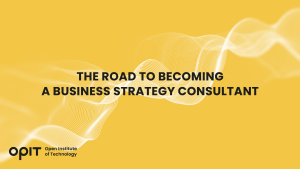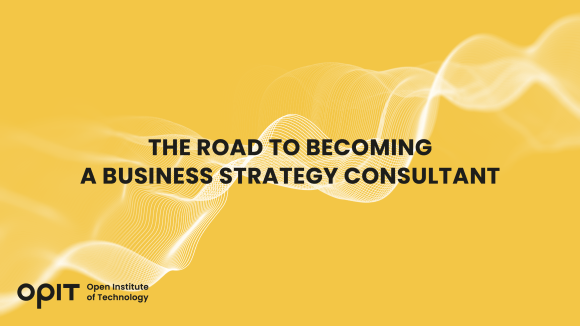

Business strategy consulting is a growing field. Digital transformation is one trend driving the need for consultants who can provide advice and support on areas existing business leaders aren’t familiar with. Emerging technologies like AI and machine learning also offer opportunities for strategy consultants. If you feel like you’ve got your finger on the pulse of modern business trends, it could be a very profitable career choice.
OPIT’s BSc in Digital Business provides an educational pathway to achieving success as a business strategy consultant. If you already have a bachelor’s degree, a master’s could be your next step to gaining thorough proficiency in this field.
Understanding Business Strategy Consulting
Successful companies tend to be very good at what they do, whether that’s providing a physical product or a service. The most successful firms know that for some things, they need external help. Business strategy consultants are usually third-party, outsourced professionals who spend time with the company on a temporary basis. They’re onboarded to deal with specific challenges, from employee churn to reduced profits.
Consultants use their business acumen and digital skills to assess problems and suggest solutions. They may also help implement those solutions, set goals and KPIs, and monitor results. The success of a consultant’s strategy could determine the future of their career. With that in mind, these professionals are highly driven to help the companies they work for succeed.
Specific responsibilities may involve:
- Assessing current budgets and financial processes
- Liaising with executives from CEOs to CFOs
- Driving efficiencies across various departments
- Identifying growth opportunities
What skills does a business strategy consultant need to perform these duties? Ideally, they’ll have a strong grasp of the company’s industry. They also need to demonstrate digital fluency, particularly in data analysis and visualization. Business consultants must also be objective, great listeners, and effective communicators.
Educational Pathways to Business Strategy Consulting
Business strategy consultants need a bachelor’s degree at the very minimum. OPIT’s BSc in Digital Business covers many of the skills needed for success in this role. You’ll learn business management skills alongside computer science. There are sections on managerial economics, project management, and digital analytics — all critical knowledge for a business consultancy role.
Graduates can opt for a master’s degree to hone their skill set. The MSc in Applied Digital Business delves deep into business strategy and its interplay with digitalization. There’s also the opportunity for an internship to gain real-life experience.
Building Your Career as a Business Strategy Consultant
Your degree is a great foundation for your career as a business strategy consultant. However, it’s important to build up from here any way you can. Here’s one step-by-step pathway you could follow to achieve success as a business consultant.
- Take an Internship
As mentioned before, some courses come with the opportunity for internships. Consider seeking time working with existing consulting firms. You might want to think about the industry you’re most interested in and opt for organizations within that sphere. Another option is to approach companies within that market and offer your services to get as much experience as possible.
- Create a Network of Contacts
While you’re finding ways to gain this experience, start building a network of contacts. A business leader who is impressed with your internship now might hire you in the future. Make sure you keep a record of their details. You can also attend conferences, webinars, and industry trade shows. Speak to people, tell them what you do and what your goals are. It’s a great way to meet people with similar interests and make contacts that can help your career.
- Embrace Life-Long Learning
Continuous education is also vital. The digital landscape is always shifting, so business strategy consultants have to keep up with trends in transformation and data management. Seeking out courses that you can complete alongside your existing career is one way to ensure you’re always ahead of the curve.
Key Skills for Success in Business Strategy Consulting
All business strategy consultants need the following skills:
- Knowing how to make tough calls.
- Handling conflict and objections.
- The ability to make snap decisions.
- Utilizing multiple streams of data to make those decisions.
- The determination to see projects through to completion.
- The confidence to take risks and pivot when something isn’t working.
Your OPIT courses support you in the development of these skills. Because you study foundational business skills alongside data science, you learn how to connect analysis to business decisions. You can quickly justify what others might see as brash choices by visualizing the data that led to that path.
OPIT’s Role in Shaping Future Business Strategy Consultants
At OPIT, our courses are helping create a highly skilled cohort of business strategy consultants. The career-aligned courses are designed to meet the demands of the consultancy industry and the digital needs of the companies you’ll work with.
The BSc in Digital Business is a fully remote, online course. The program runs over five terms, with a final additional term for completing your dissertation project. The minimum timeframe is 24 months, but 36 months is the standard length.
You’ll start with business fundamentals, moving on to computer architectures, ICT skills, and web development. More importantly, for prospective consultants, you cover digital business models, business strategy, and critical thinking.
The MSc in Applied Digital Business builds on what you already know. You’ll cover data science and AI and how it fits into the digital economy. From here, you’ll discover business problem-solving, digital project management, and entrepreneurship, among other topics.
After your third term, you’ll start your thesis project, where you’re encouraged to intern with a trusted industrial partner. You can complete this course in 12 months on the fast-track plan, and the regular duration is 18 months.
As well as the high-quality course content and opportunities to work with professionals, you gain access to unparalleled student support. It’s important that students don’t feel alone or isolated during remote learning. With the proper support, online or hybrid study can be more effective than traditional classroom or lecture-based learning. Analysis from the UK shows that 85% of studies on online learning confirm that supportive, digital courses are more beneficial to students than conventional courses.
Combine Digital Fluency With Business Expertise for a Lucrative Career
Your role as a business strategy consultant could change the direction of many companies. The satisfaction you’ll gain from driving success and transformation is second to none. Successful consultants never stop learning, always discovering new ways to uncover business opportunities.
If you’re excited to start your journey towards business strategy consulting, explore OPIT’s available courses or contact us for more details.
Have questions?
Visit our FAQ page or get in touch with us!
Write us at +39 335 576 0263
Get in touch at hello@opit.com
Talk to one of our Study Advisors
We are international
We can speak in:




